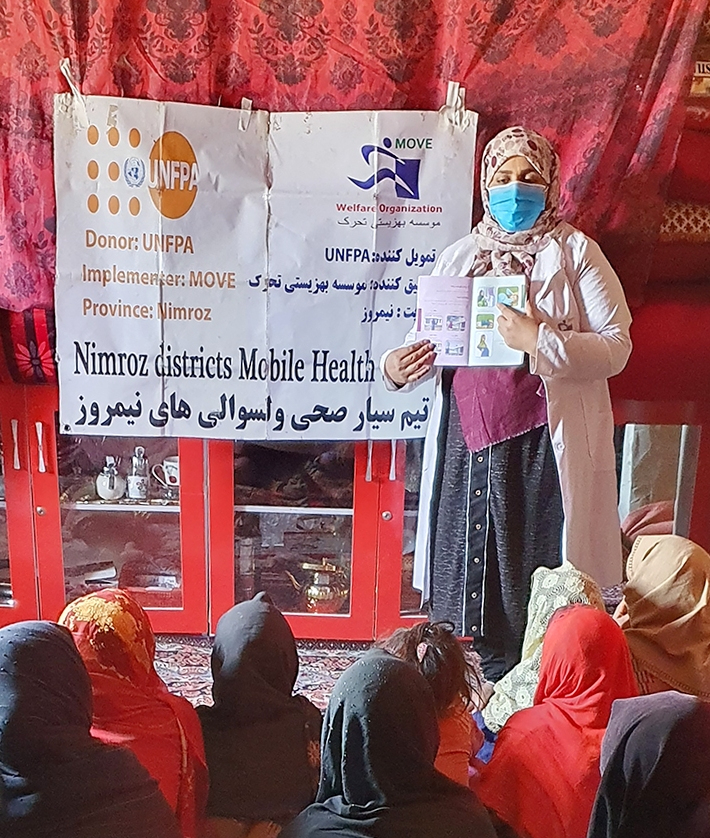News
UNFPA midwives on call to ensure safe births in Afghanistan’s most remote villages
- 16 March 2023
News
NIMROZ, Afghanistan – “Wake up! We have a delivery!” Suhila Rasuli whispered urgently the phone so as not to wake up the rest of her family so early in the morning.
The call had come from the Qala-e-Naw village. “A pregnant woman was in labour and they needed me,” recalled Ms. Rasuli, a midwife who works with a UNFPA-supported mobile health team. She glanced at the clock – it was almost 6 a.m. but still pitch black on that wintry morning.
She quickly donned her uniform and prepared her equipment, including a UNFPA clean delivery kit containing essential supplies – such as a plastic sheet, sterile gloves, a razor blade, tie for the umbilical cord and washcloths – for births that take place outside health centres.
In half an hour, she was on her way to Khash Rod district in Afghanistan’s southwestern Nimroz province. Travelling with her was Niamatullah Haidari, a vaccine specialist with the mobile health team. They drove for about two hours in freezing winter temperatures, navigating treacherous and uneven terrain to reach the mother in labour. The heavy rain from the previous week made it even more difficult, but Mr. Haidari explained, “We had to stay on that path to reach the village. If we took an alternate route, we might drive through land mines”.
Mobile health teams are roving medical units that provide a range of services, particularly maternal, newborn, child and adolescent health care and psychosocial support in remote communities. Despite a perilous security situation, some 117 UNFPA mobile teams are defying tremendous odds to reach an estimated 1.5 million people across 25 provinces in Afghanistan.
Defeating fear, delivering hope
The location of the village wasn’t new to them – Ms. Rasuli had delivered a baby from another woman in the same family less than a month earlier. “Before leaving last time, I had given my contact number to the villagers and told them to call me anytime they needed help. I’m glad they remembered,” she told UNFPA.
In the most remote villages, accessing the nearest health facility can mean trekking on foot over rough and dangerous land, sometimes for hours – a feat quite simply impossible for the estimated 24,000 women who give birth each month in these areas. Their communities account for most of the country's maternal and childhood illnesses and deaths – Afghanistan already has one of the world’s highest rates of maternal deaths, with a woman dying every two hours during pregnancy or childbirth, mainly from entirely preventable causes.
Ms. Rasuli said travelling for hours to reach a patient used to unnerve her. But she added, “I find courage in the fact that the families believe in my professional capacity, and that they are comforted and assured that the mother and baby will be fine under my care.”
Finally reaching their destination, Ms. Rasuli immediately attended to the mother. Two hours later, she announced the birth of a baby boy, the mother’s third child. “The delivery was normal and everyone applauded with joy when they learned that both mother and baby are doing fine,” Ms. Rasuli said.
Access a serious challenge for many Afghans
Mr. Haidari explained that before the mobile health team was established, people living in remote areas of the province had no immediate access to what can be life-saving health services. Transport to the nearest health facility was rarely available or within financial reach for most villagers. “There were a lot of maternal and newborn deaths before because most deliveries took place at home, without the help of a skilled birth attendant,” he said.

UNFPA works with NGO health partner MOVE in Nimroz, thanks also to funding from the governments of Italy, Japan, the United Kingdom and the United States, as well as the European Union.
Ms. Rasuli started working with the mobile health team four months ago, and has since delivered nearly 30 babies with them. “Assisting deliveries is a big responsibility that makes me nervous sometimes. But when it is done, it feels like an achievement and a great relief when I see everyone happy and giving me the credit for taking care of two lives – the mother and the baby,” she said.
Making motherhood safer is a human rights imperative and lies at the core of UNFPA’s mandate: Afghan women like Ms. Rasuli are an integral part of our support in a country where more than two thirds of the population rely on life-saving assistance each month. Despite a challenging and shrinking operating environment in which the freedom of movement of women and girls – along with their access to health services – has been severely restricted, UNFPA remains committed to stay and deliver on behalf of the Afghan population in need.